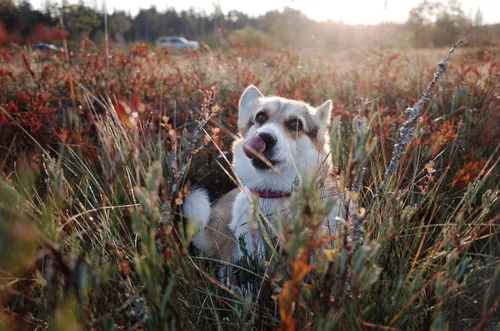As pet owners, we always want to share the best of what we have with our dogs, especially when it comes to food. As you toss these tart little berries into your salad or smoothie, you might wonder, “Can dogs eat cranberries?” This question is more than just curiosity; it’s about understanding what’s safe and beneficial for your dog’s diet. Before sharing with your companion, you should be aware of the role cranberries can play in your dog’s nutrition and the considerations to keep in mind.

Are Cranberries Safe for Dogs?
Cranberries are generally safe for dogs to eat in moderation. These vibrant red berries are packed with antioxidants, vitamins, and fiber, making them a nutritious option for humans. But when it comes to dogs, safety is the top priority. So, are cranberries a good treat for your canine companion? The short answer is yes, but there are a few important details to consider.
- First, cranberries are low in calories and can be a good snack for dogs that need to manage their weight.
- The natural sweetness of cranberries comes with no added sugars, making them a healthier alternative to many store-bought dog treats.
- However, feeding your dog cranberries in large amounts or as a regular part of their diet can lead to digestive issues like upset stomachs or diarrhea.
- Avoid cranberry products that contain added sugars or other harmful ingredients, such as raisins, which are toxic to dogs.
- Always opt for fresh or dried cranberries with no added ingredients, and introduce them gradually into your dog’s diet to observe how they react.
Nutritional Benefits of Cranberries for Dogs
Cranberries offer several nutritional benefits that can support your dog’s overall health. These berries are rich in vitamins C, E, and K, as well as fiber and antioxidants. Here’s how each of these nutrients can benefit your dog:
Vitamin C and Immune Support
Vitamin C is known for its immune-boosting properties, which can be beneficial for dogs, particularly those with a weakened immune system. While dogs can produce their own vitamin C, supplementing their diet with cranberries can provide an additional boost, especially during times of stress or illness.
Antioxidants and Urinary Health
The antioxidants in cranberries, particularly proanthocyanidins, can prevent harmful bacteria from adhering to the bladder walls, reducing the risk of urinary tract infections (UTIs). This is particularly helpful for dogs prone to UTIs, making cranberries a natural way to support their urinary health.
Fiber and Digestive Health
The fiber content in cranberries can aid your dog’s digestion by promoting healthy bowel movements. However, too many cranberries can have the opposite effect, leading to gastrointestinal upset. Small portions can help maintain your dog’s digestive health without overwhelming their system.
How to Safely Feed Cranberries to Your Dog
When incorporating cranberries into your dog’s diet, it’s important to do so safely and in moderation. Here are some tips on how to feed cranberries to your dog:
- Introduce Slowly: Start by giving your dog a small number of cranberries to see how they react. Some dogs may love the taste, while others might not be as keen. Observe your dog for any signs of digestive discomfort, such as vomiting or diarrhea.
- Choose the Right Form: Fresh or dried cranberries are the best options. Avoid cranberry sauces or juices, especially those with added sugars, artificial sweeteners like xylitol, or other ingredients harmful to dogs.
- Serve in Small Portions: Even though cranberries are safe, they should only be given in small amounts. You can offer them as a treat or mix a few into your dog’s regular meals for added flavor and nutrition.
- Consult Your Vet: Before making any significant changes to your dog’s diet, it’s always a good idea to consult your veterinarian. They can provide personalized advice based on your dog’s specific health needs and dietary requirements.
When Cranberries Might Not Be a Good Idea
While cranberries can be a healthy addition to your dog’s diet, there are situations where they might not be suitable. Dogs with certain health conditions or those on specific diets may need to avoid cranberries. Here are a few scenarios where caution is necessary:
Dogs with Kidney Stones
Cranberries contain oxalates, which can contribute to the formation of kidney stones. If your dog has a history of kidney stones or is prone to them, it’s best to avoid cranberries or consult your vet before offering them.
Dogs with Allergies
Though rare, some dogs may be allergic to cranberries. Signs of an allergic reaction can include itching, swelling, or gastrointestinal distress. If your dog shows any signs of an allergic reaction after consuming cranberries, discontinue use immediately and consult your vet.
High-Sugar Cranberry Products
Cranberry products with added sugars or artificial sweeteners should be avoided at all costs. These can not only contribute to obesity but also lead to more serious health issues like diabetes or even toxicity if they contain harmful ingredients like xylitol.
A Healthy and Tasty Treat Option
If your dog enjoys the taste of cranberries and tolerates them well, they can make for a healthy and tasty treat. Here are some fun and safe ways to incorporate cranberries into your dog’s diet:
- Frozen Cranberry Treats: Blend cranberries with a little water and freeze them into small ice cubes. These can be a refreshing treat on a hot day.
- Cranberry-Infused Meals: Mix a few chopped cranberries into your dog’s regular food for added flavor and nutrients.
- Homemade Cranberry Dog Biscuits: Bake a batch of dog-friendly biscuits using whole wheat flour, a few cranberries, and a dog-safe sweetener like honey.
These options not only provide a nutritional boost but also offer a variety of textures and flavors that your dog may enjoy.
Keep Your Dog’s Diet Balanced
While cranberries can be a healthy addition to your dog’s diet, they should never replace a balanced and complete dog food. Remember that treats, even healthy ones like cranberries, should only make up a small portion of your dog’s overall diet. A well-balanced diet formulated to meet your dog’s specific nutritional needs contributes to their long-term health and well-being. At Live Oak Veterinary Hospital, our knowledgeable team of veterinarians is here to help you navigate the best dietary choices for your dog. Call us at 209-432-9437 or book an appointment online today!
